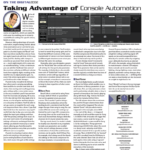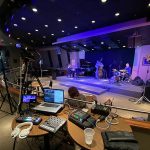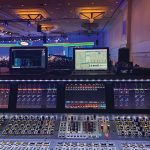Concentrating on people and product over price brings success in Nashville.
In a town where you can find a sound company on just about every other corner, the team at Hugh Bennett Productions has made its mark in Nashville as one of the region’s top companies. Michael Allen, who was serving as the company’s supervisor before purchasing it in May, attributes the company’s lon-gevity to concentrating on people and product over price.
“You have to choose two of those, because you can’t have all three,” he says from the company’s headquarters. “If you are going to play on the price side of things, you’re going to play the cutthroat games and end up never making any money. That’s something that I don’t fool with. So that leaves people and product. We’ve got a pretty decent product and really good people — guys that don’t stress out, freak out or get the clients upset.”
The company philosophy derives, in part, from Hugh Bennett himself. He has been involved in the music business for the past 30 years as road manager for such Nashville legends as Johnny Rodriguez and Johnny Paycheck. In the ‘90s, Bennett started a production company that had a stage and a small P.A. In 2000, Allen says, the decision was made to take the next step. “It was time to move forward or stay stagnant,” he reports. “So, we stepped up the audio side of things and brought in a couple of decent desks. You know, kind of got out of what would be considered the small sound company ma-and-pa kind of stuff.”
The purchase of that gear, he adds, also enabled the company to go after more work. “People are going to come calling when they know that you’ve got decent gear that can do a good-sized show,” he says. Over the past seven years, HBP has added more audio gear, a pair of single-hung 60K lighting rigs, some video gear and staging.

That’s not to say the company has gone out and spent a daunting amount on gear. On the audio side of things, HBP has a Midas XL 200 and a Midas XL 250 in stock along with a NEXO Alpha rig and a medium-format Worx Audio Technologies True Line V8 line array. The line array, Allen explains, is “a simple little rig that’s good for corporate stuff. You don’t see it much on riders, but it’s an excellent sounding system for the money.” Crest Audio power amps are used across the board.
Know Your Market
So far, the company has resisted the move to a large-format digital console. “I don’t carry any because there are so many in town,” he explains. “It’s easier for me to cross-rent rather than justify having them sitting here. If they are sitting, they’re not making money. I’ve got Clair Brothers two or three miles down the road and Spectrum Audio on the other side of town. Between the two of them, they have every digital you can think of.”
That said, Allen allows that he’s watching how things shake out. “I’m one of those people who sits back and watches the market to see who’s doing what. Typically you don’t buy a digital piece that’s fresh out on the market because they haven’t worked the bugs out yet, no matter what they say. ”The company’s first move would probably be a Yamaha M7CL console, rather than something larger à la a PM1D or something from DiGiCo or Digidesign. “I would really have to have some clients that absolutely wanted those.”
Allen knows that the hard truth for a regional sound company is that upgrading any gear gets expensive quickly. “Yeah, the amount of money you’ve got to spend on gear and the amount of time it takes you to get your returns is pretty unbelievable in this industry,” he says.
So, it’s a balancing act. “I basically run the company, for the most part, so I’ve got to make smart decisions — one’s I can justify,” he explains. “You can argue the point that if you have something in here, it’s probably going to be rented, but you also have to think ‘How many clients do I have now who care whether or not they had a digital or analog desk?’ It’s a fine line, and at some point we’ll end up having some digital in-house. It’s inevitable, because everything is going that way. It takes up less space, and you don’t have to have six guys to table it.”
The same can be said for the company’s use of Worx Audio line array, and Allen is investigating larger arrays from JBL or EV. “Worx Audio has a larger array, but you’re not seeing it on riders as of yet, at least not on a regular basis. So, I’ve got to watch that, too,” he admits. “If they are friends of mine, or a national act’s production manager who I know personally, it’s easy to tell them that they’ll love the box, and they trust my opinion. But, if it’s not something they are used to seeing out on tour or in any given show, you shouldn’t have to sell the box. If you have to sell the box, it can turn into a big fight. It gets tiresome.”

The company’s current collection of gear enables them to serve a roster of clients who put on festivals, concerts and corporate gigs. Recent work includes the WKDF Birthday Bash that featured Clay Walker, Trent Tomlinson and Eric Church; a Keyshia Cole show at Tennessee State University; and a Michael W. Smith concert at the Nashville Superspeedway.
Allen points out that because of the volume of work in and around Nashville, that the region’s sound companies aren’t in strict competition. “There’s so much work here that, for the most part, everybody stays out from under each other’s feet,” he says. “The guys who have sound companies in town have been in business for years, so we all know each other. Everybody knows who’s got what contracts and such, and you try to stay out of each other’s way as much as possible.”
Keeping It Lean
That type of collaborative environment enables Allen to keep a skeleton crew on staff, because he can scare up a number of pros at a moment’s notice. In fact, the company has only a small staff of four, including Allen. “There’s a shop manager who preps the gear, turns it around and counts it back in,” he re-ports. “We keep him busy. We have a lighting/audio guy who favors lighting more than audio, which is good because that gives me somebody who wants to maintain the 60K when the audio guys don’t. Then I have a dedicated staging guy. I basically run the show, handling the phone calls that come in. I don’t get to go out and mix as much as I used to, but every now and then I get my hands dirty.”
Keeping the staff at a manageable level is important for Allen because then he can ensure that quality people are on every job. It comes back to the people, product and price equation. “Good people are really hard to come by, and if you have people who clients don’t like to deal with, they are not going to call you back,” he reports. “They can suffer through price if you’ve got a decent product and decent people. On the other hand, if you’re doing the cutthroat price thing, usually your product isn’t that great and neither are your people if you can afford to get your prices down that low.”
Know a regional soundco that deserves some props? E-mail regionalslants@fohonline.com.



